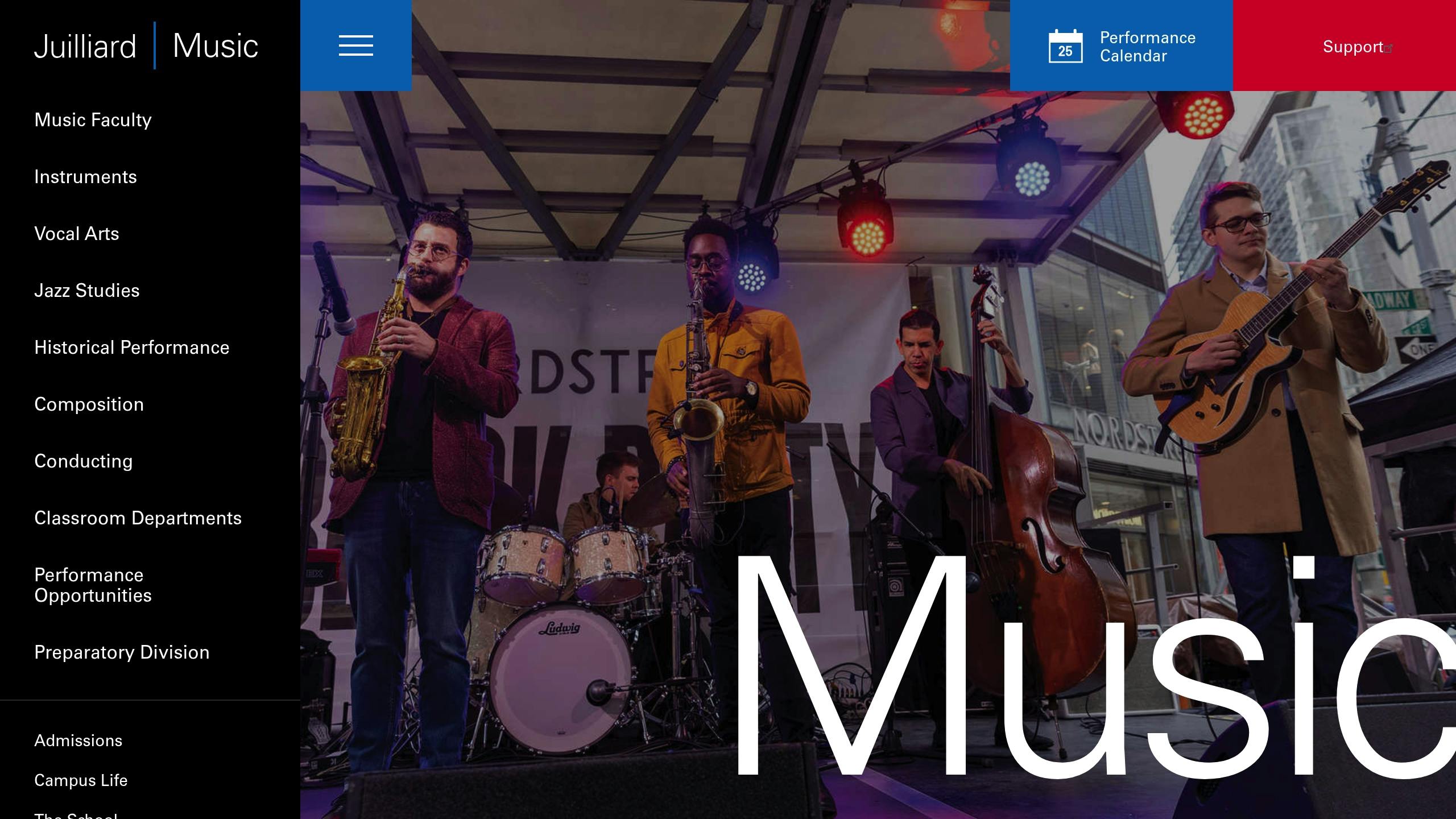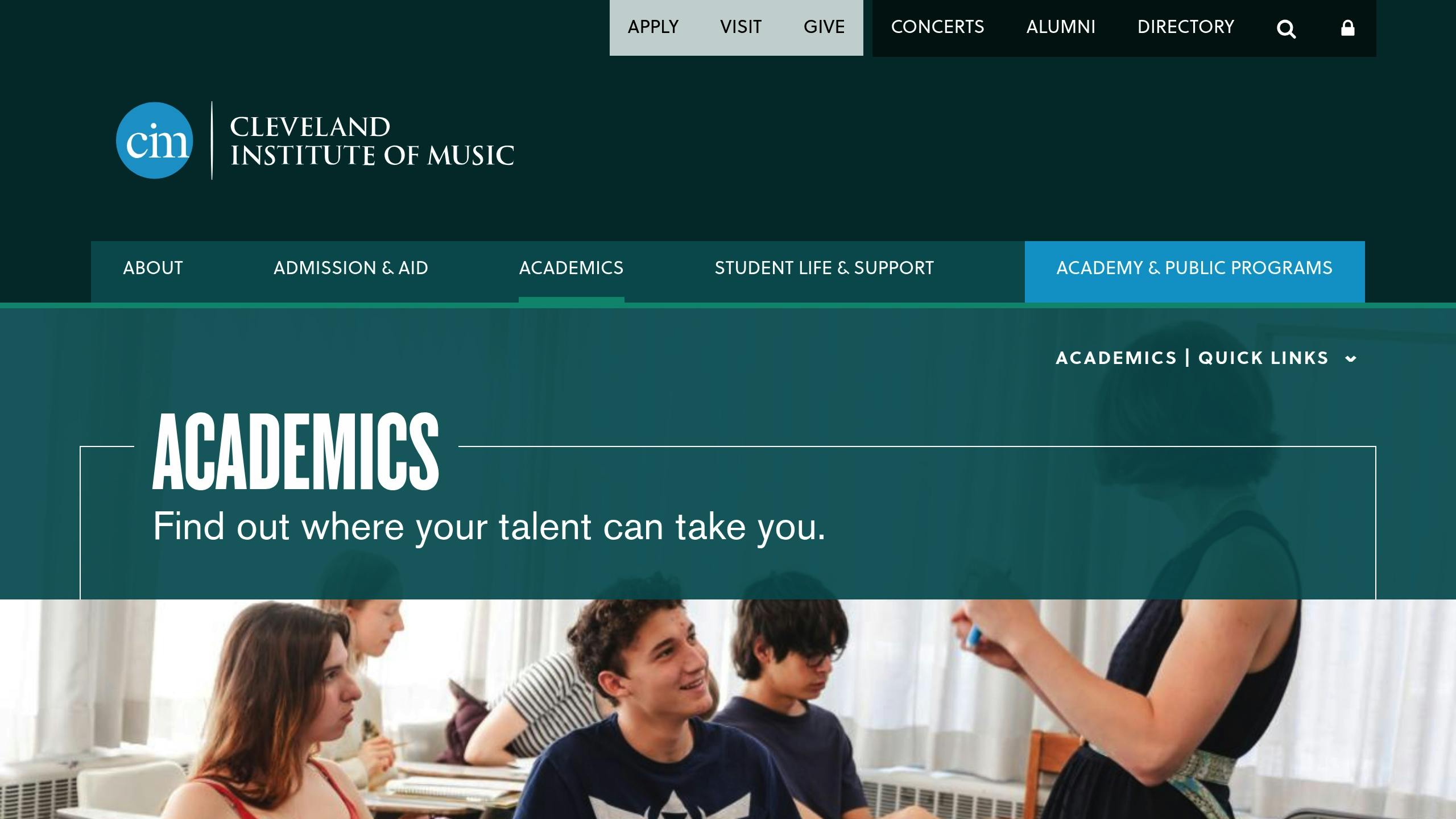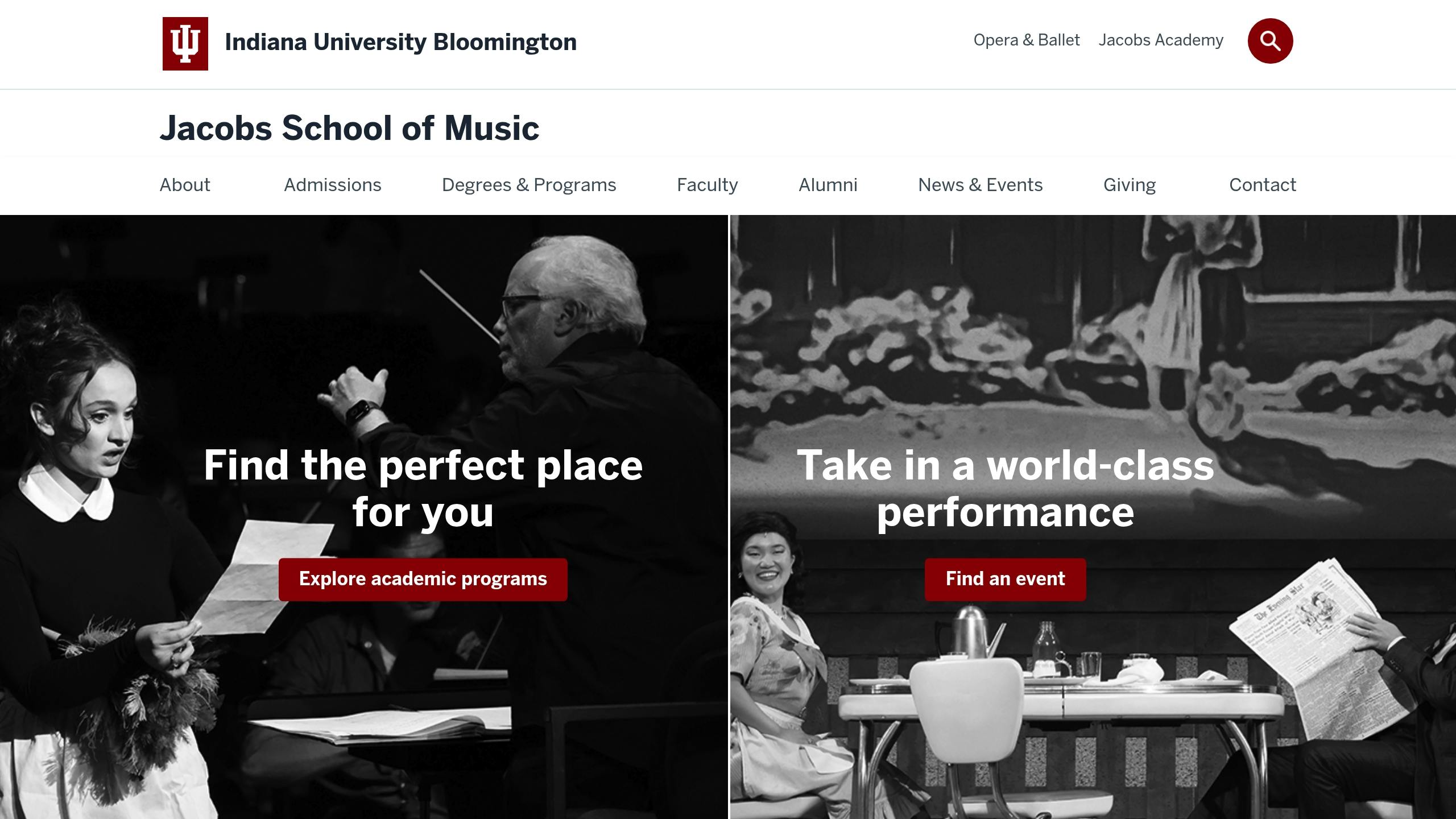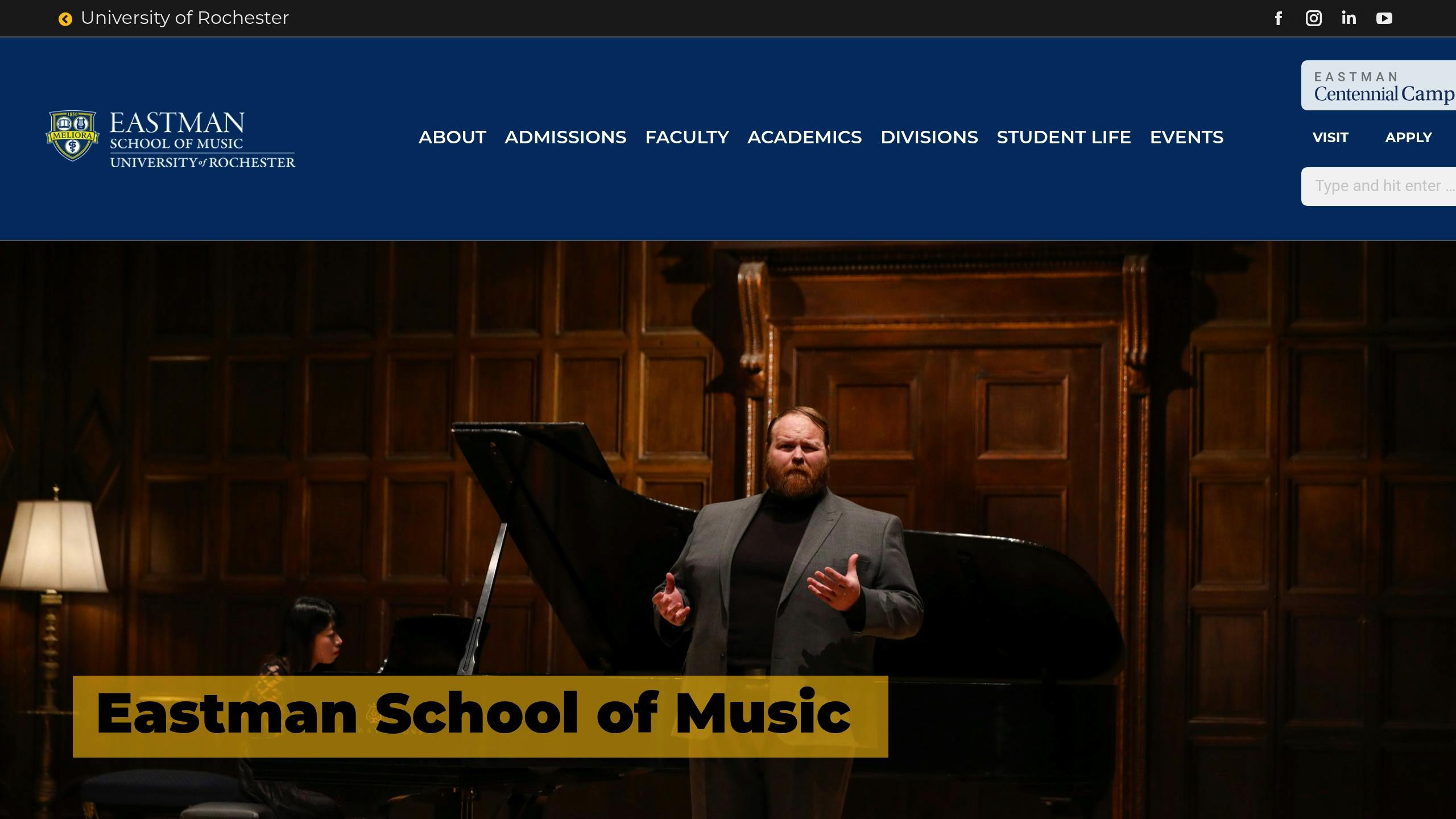Collaborative piano is a specialized field where pianists work closely with vocalists, instrumentalists, and ensembles. If you’re considering a degree in this area, here are six top programs to explore:
- Juilliard School (New York, NY): Focuses on vocal coaching, opera, chamber music, and career preparation, with access to Lincoln Center performances.
- New England Conservatory (NEC) (Boston, MA): Offers vocal and instrumental collaboration training, with performances in historic Jordan Hall.
- University of Michigan (Ann Arbor, MI): Features vocal and instrumental tracks, a Piano Technology Lab, and extensive performance opportunities.
- Cleveland Institute of Music (Cleveland, OH): Emphasizes real-world preparation with workshops, career development, and low student-to-faculty ratios.
- Indiana University Jacobs School of Music (Bloomington, IN): Provides vocal and instrumental tracks, access to large-scale opera productions, and robust facilities.
- Eastman School of Music (Rochester, NY): Focuses on piano accompanying and chamber music, with strong financial aid options and performance venues.
Quick Comparison
| School | Location | Tracks Offered | Key Features | Financial Aid Options |
|---|---|---|---|---|
| Juilliard School | New York, NY | Vocal & Instrumental | Lincoln Center access, career preparation | Not specified |
| New England Conservatory | Boston, MA | Vocal & Instrumental | Jordan Hall performances, small class sizes | Not specified |
| University of Michigan | Ann Arbor, MI | Vocal & Instrumental | Piano Technology Lab, Ann Arbor Symphony partnerships | Graduate assistantships |
| Cleveland Institute | Cleveland, OH | Vocal & Instrumental | Career development, merit-based scholarships | Scholarships, assistantships |
| Indiana University | Bloomington, IN | Vocal & Instrumental | IU Opera Theater, large performance spaces | Assistantships (up to 100%) |
| Eastman School of Music | Rochester, NY | Vocal & Instrumental | Eastman-Shands Competition, Sibley Music Library | Scholarships, assistantships |
Each program offers unique strengths tailored to aspiring collaborative pianists. Choose based on your career goals, specialization, and preferred environment.
Collaborative Piano Studies at NEC
1. Juilliard School
The Juilliard School, based in New York City, offers a Master of Music in Collaborative Piano aimed at preparing pianists for a wide range of collaborative roles.
Students perform regularly in renowned venues equipped with top-tier pianos. The program focuses on areas like vocal coaching, art song interpretation, chamber music, opera coaching, orchestral reduction, sight-reading, transposition, and diction. With private lessons and masterclasses, students receive personalized guidance from highly respected faculty.
Beyond artistic training, the program emphasizes career preparation. Students gain support in performance readiness, career management, and building professional connections.
Located at Lincoln Center, the school provides unparalleled access to premier performances and opportunities to engage with leading artists.
2. New England Conservatory
The New England Conservatory (NEC) in Boston offers a Master of Music in Collaborative Piano, blending intensive training with plenty of live performance opportunities. This program emphasizes both technical skills and real-world experience on stage.
At the heart of the program is the historic Jordan Hall, built in 1903, which serves as the main recital space. It features a Steinway concert grand piano, elevating the quality of student performances.
The curriculum is structured around three main areas:
- Vocal Collaboration: Focuses on art songs, opera, and choral works.
- Instrumental Collaboration: Covers chamber music and accompanying wind and string instruments.
- Professional Development: Includes career management and entrepreneurship training.
Students benefit from weekly private lessons with active Boston-based musicians and enjoy small class sizes of just 4–6 students, ensuring tailored instruction and frequent performance opportunities.
The program also includes an integrated studio component, allowing students to work directly with vocalists and instrumentalists. This hands-on approach helps build a broader repertoire and sharpens coaching skills.
Located in Boston’s vibrant cultural scene, NEC provides connections to renowned institutions like the Boston Symphony Orchestra and Boston Lyric Opera. Students gain access to performances, masterclasses, and networking opportunities.
Key program requirements include:
- Two full-length recitals showcasing both vocal and instrumental repertoire.
- Weekly studio classes and performance labs.
- Chamber music concerts every semester.
- Participation as a rehearsal pianist in opera productions.
3. University of Michigan
The University of Michigan’s School of Music, Theatre & Dance offers a Master of Music in Collaborative Piano program, housed in the Moore Building. This program provides two specialization options: vocal or instrumental collaboration.
The Vocal Track focuses on:
- Art song repertoire in multiple languages
- Opera coaching techniques
- Skills for choral accompaniment
- Diction proficiency in French, German, and Italian
The Instrumental Track emphasizes:
- Chamber music performance
- Collaboration with string and wind players
- Contemporary repertoire
- Score reading and reduction
This dual-track system offers students targeted training while providing extensive performance and professional growth opportunities.
A standout feature of the program is the Piano Technology Lab, where students gain hands-on experience in piano maintenance and mechanics – essential knowledge for accompanists working with a variety of instruments.
Performances take place in multiple venues across campus, and the curriculum includes weekly masterclasses with visiting artists, ensemble coaching, and regular performance opportunities.
The Professional Development section of the program covers:
- Concert programming
- Recording techniques
- Workshops on performance psychology
- Basics of arts administration
Students also perform off-campus through partnerships with organizations like:
- Ann Arbor Symphony Orchestra
- Michigan Opera Theatre
- Detroit Chamber Winds & Strings
With only 4-6 students admitted each year, the program ensures individualized attention and ample performance opportunities. Students have access to 45 practice rooms, all equipped with Steinway pianos, as part of UMich’s All-Steinway School designation.
Graduate assistantships are available, covering up to 50% of tuition and offering a monthly stipend. These roles involve undergraduate accompaniment and participation in opera productions.
Faculty members, who are active performers themselves, provide weekly one-hour lessons and additional coaching tailored to each student’s chosen track.
sbb-itb-b8bc1ab
4. Cleveland Institute of Music
The Cleveland Institute of Music offers a Master of Music in Collaborative Piano, focusing on both vocal and instrumental collaboration. The program covers key areas like advanced sight-reading, score reduction, diction, chamber music, and opera coaching, equipping students with the skills needed for a career as a collaborative pianist.
Students gain hands-on experience through regular performances and workshops that mimic real-world professional settings. The program also includes career-focused elements such as career development sessions, recording opportunities, and training in performance psychology and entrepreneurship, helping students prepare for life after graduation.
With a low student-to-faculty ratio, the program ensures personalized mentorship in state-of-the-art rehearsal spaces. Financial aid is available through merit-based scholarships and graduate assistantships, making the program more accessible.
Situated in Cleveland’s vibrant arts district, the program provides an inspiring setting for artistic development and building professional connections.
5. Indiana University Jacobs School of Music
The collaborative piano program at the Indiana University Jacobs School of Music offers a Master of Music degree in Collaborative Piano, with focused tracks in vocal and instrumental collaboration. Students benefit from a rich curriculum and top-tier facilities designed to support their development.
The program is housed in the Musical Arts Center, which features impressive performance spaces, including a 1,460-seat opera theater and the 400-seat Auer Concert Hall. With over 200 practice rooms equipped with Steinway pianos, students have plenty of opportunities to rehearse and prepare for performances. These resources ensure a hands-on, performance-driven learning experience.
Curriculum Highlights
The program emphasizes practical and academic growth, offering courses such as:
- Advanced Repertoire Studies: In-depth focus on vocal and instrumental music from various eras and styles.
- Language and Diction: Training in Italian, German, and French diction to enhance vocal collaboration.
- Chamber Music: Regular opportunities to work closely with both instrumentalists and vocalists.
- Professional Development: Workshops on career planning, networking, and essential business skills.
One standout feature is the program’s connection to the IU Opera Theater, one of the largest collegiate opera programs in the country. Collaborative piano students gain hands-on experience as rehearsal pianists and vocal coaches for full-scale opera productions.
Facilities and Resources
Students have access to collaborative studios equipped with recording technology and smart boards for score analysis. The Music Library boasts one of the largest collections of collaborative piano scores and recordings in North America, with over 50,000 items available.
Financial Support and Enrollment
The program accepts only 4–6 students each year, ensuring personalized attention. Graduate assistantships are available, covering up to 100% of tuition and offering monthly stipends ranging from $850 to $1,500, depending on the role and experience.
Additional Opportunities
Students participate in masterclasses with visiting artists, national competitions, and conferences. Located in Bloomington, Indiana, the program is part of a lively arts community. Housing costs in the area range from $800 to $1,200 per month, making it an affordable option for students pursuing their musical careers.
6. Eastman School of Music
Part of the University of Rochester, the Eastman School of Music offers a Master of Music in Piano Accompanying and Chamber Music. With only 4–5 students admitted each year, the program ensures personalized mentorship and plenty of performance opportunities.
The program focuses on:
- Vocal and Instrumental Collaboration: Training in art song, opera, and instrumental chamber music repertoire.
- Career Preparation: Workshops and chances to perform with the Rochester Philharmonic Orchestra.
- Language Skills: Intensive diction classes.
- Chamber Music: Weekly coaching sessions with experienced faculty.
Performance Spaces
Students perform in several impressive venues:
- Kilbourn Hall: Seats 444 and is known for its excellent acoustics.
- Hatch Recital Hall: A 222-seat space equipped for recordings.
- Kodak Hall: A large venue with 2,326 seats, ideal for orchestral events.
Facilities and Resources
Eastman students benefit from top-notch resources, including:
- The Sibley Music Library, with over 750,000 items.
- 40 practice rooms and 6 collaborative studios.
- Digital recording tools, score preparation software, and historical keyboard instruments.
Financial Support
The program offers generous financial aid options:
- Merit-based scholarships covering 25% to 100% of tuition.
- Graduate assistantships with annual stipends between $8,000 and $12,000.
- Teaching opportunities at the Eastman Community Music School.
Professional Opportunities
Students participate in events like the Eastman-Shands Collaborative Piano Competition and the Eastman Summer Chamber Music Institute. Located in Rochester, New York, the school offers a thriving arts community and affordable living costs, with average monthly rent ranging from $900 to $1,400. These features make Eastman a standout choice for collaborative pianists.
Program Selection Guide
Consider these important factors when choosing a collaborative piano program.
Faculty Assessment
When looking into the faculty, pay attention to:
- Active Performers: Choose instructors who are still performing regularly.
- Teaching Approach: Speak with potential mentors to understand their teaching style.
- Graduate Success: Look into where recent alumni are working and how their careers have progressed.
Key Resources
A strong collaborative piano program should provide:
- Practice Spaces: Well-maintained studios with high-quality grand pianos.
- Recording Tools: Access to professional audio and video recording equipment.
- Performance Spaces: A variety of venues suitable for different ensemble sizes.
- Music Library: A rich collection of sheet music and digital materials.
These resources are essential for building both skills and career readiness.
Career Development Opportunities
Top programs equip students for various career paths by offering:
- Performance Opportunities: Regular studio classes, masterclasses, chamber music concerts, and opera rehearsals.
- Professional Skills Training: Workshops on score reading, language and diction courses, business management seminars, and experience with recording sessions.







